A lot of people ask me if can cockatiels eat mango and I always admire when somebody does their research before feeding their bird something new. Too many pet-owners assume that a food is okay for their animal to consume without investigating whether or not that’s true.
In today’s article, I’ll go through everything you need to know about offering your cockatiel this delicious fruit. First, we’ll consider whether they can safely eat it. Then, we’ll talk about anything you should be aware of. We’ll also go over how to feed them this fruit and other related topics.
If you’re looking for a brief response to the question of whether or not you can safely offer mango to your cockatiel, here it is: Cockatiels can consume mango. The fruit is non-toxic and can even help them because it’s high in vitamins and minerals. Make sure to offer your pet a wide range of fruits, rather than just mangoes. Also, be careful not to overfeed your bird.
In order to get the most complete answer on how to correctly feed mangoes to your cockatiel and avoid any possible problems, I recommend reading through this whole article.
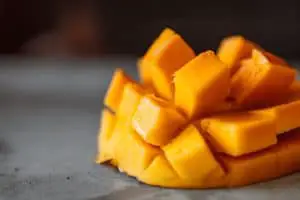
Can Cockatiels Eat Mango?
So, can cockatiel eat mango? Mangoes are juicy fruit indigenous to South Asia. India is the world’s primary producer of mangoes. I’m not going to give a detailed history of the mango right now.
Though, I will give a short explanation of the nutrients that are found in this juicy fruit. In doing so, we can have a better understanding of what we’re giving our cockatiel to eat. With that being said, let’s take an informative look at what the data says is in 1 cup (about 165 grams) of this succulent fruit.
A whole cup of mango would be dangerous for our cockatiel to consume because they only weigh around 70-120 grams.
Even though we’re looking at the nutrients in small quantities, the relative amount of nutrients stays consistent. For example, if we take a look at mangoes, they are low in calories and fat but contain a good amount of fiber!
Although they are healthy, cockatiels should not have too much sugar in their diet from this fruit. Also, be careful not to include fruit seeds.
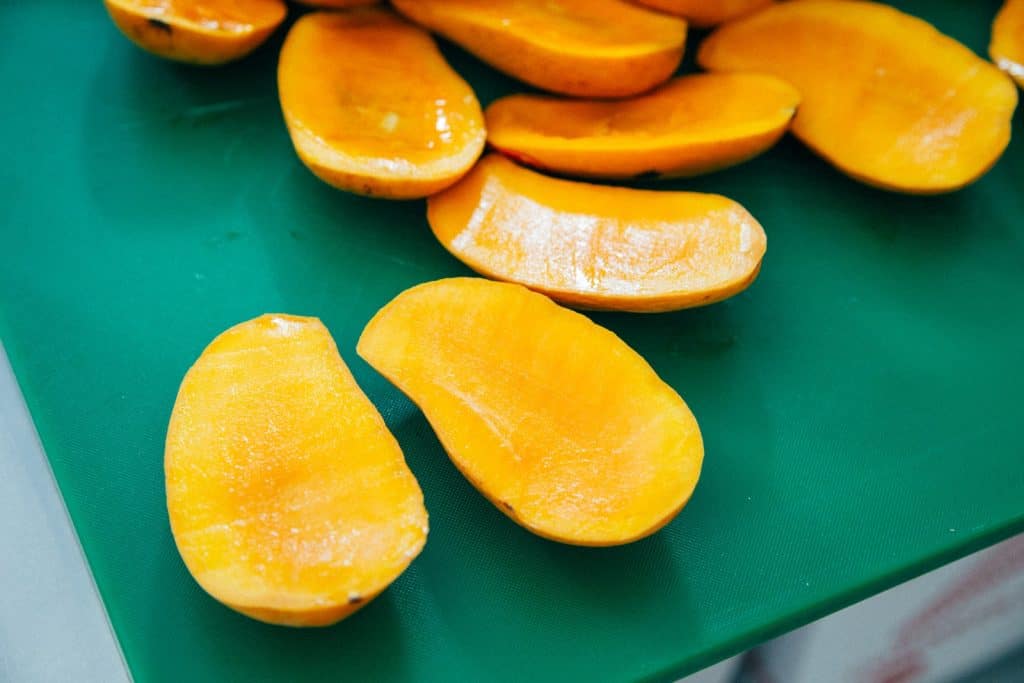
Vitamins and minerals
So far, we’ve only talked about the macronutrients, but make no mistake, mangoes are very rich in several key vitamins and minerals.
Furthermore, these fruits contain essential vitamins such as Vitamin C, K, B6, and A. They are also a good source of minerals like Potassium, Magnesium, and Calcium–nutrients that are typically not found in the average diet of pellets and seeds. Consequently, adding fruit to their diet is an excellent idea.
Although they’re native to tropical regions, it’s still important for them to consume fruits like mangoes in order for them to thrive. They’re also a great source of antioxidants and electrolytes.
Can Cockatiels Eat Frozen Mango?
Cockatiels can eat mango, but it is generally recommended to offer them fresh mango rather than frozen. Fresh fruits are usually more nutritious and have better texture and taste for birds. While frozen mango is not toxic to cockatiels, the freezing process can affect the texture and quality of the fruit. Thawed frozen mango may become mushy and watery, which may not be as appealing to your bird.
If you want to offer mango to your cockatiel, it’s best to provide fresh, ripe mango slices. Make sure to wash the fruit thoroughly, remove the pit, and cut it into small, manageable pieces. Introduce mango to your cockatiel’s diet gradually and observe how they respond to it. Remember that fruits should be offered as a treat and not as a primary diet component. It’s important to provide a balanced diet for your cockatiel that includes a variety of foods such as pellets, fresh vegetables, and occasional fruits as treats.
Can Cockatiels Eat Mango Safely?
Yes, your cockatiel can eat them without any problems. Nothing in the fruit is harmful to your bird, but there are a few things to be aware of. First and foremost, you must ensure that the rind is removed. The skin may be consumed, although it isn’t particularly tasty or necessary for your cockatiel to digest. Furthermore, because pesticides are found in the skin, it’s not something you want your cockatiel to consume. Pesticides are potentially dangerous;
Second, be cautious not to over fatten your parrot. Cockatiels have a fast metabolism, but they can become overweight if fed too much food. Make sure you keep their diet balanced.
Finally, do not offer them the stone (seed) as food. If you put it in there, your bird will most likely refuse to eat it since they are instinctively aware that it is poisonous (they consume plenty of mangoes in nature). However, it’s better to be safe than sorry and remove it anyhow.
How Much Mango Can Cockatiels Eat?
Cockatiels, according to veterinarians, require fruits and vegetables in their diet. It allows them access to nutrients that their pellets and seeds do not contain, as I’ve previously said. Fresh fruits and vegetables account for approximately 20 to 25% of a cockatiel’s diet.
Although mangoes are a great fruit for your cockatiel, you must make sure to offer them other fruits and vegetables as well. It’s key that they eat various kinds of produce so they get the right mix of vitamins and minerals. You can give your cockatiel a small piece of mango every few days on average. If you want to introduce your pups to new foods, start with a tiny portion and gradually increase the amount until they’ve eaten it before. You may keep an eye out for any issues this way. If there are difficulties, stop providing them with it and offer them different fruits instead. Feeding it to them too much if they eat it well, and there are no symptoms of runny stool or other concerns, is perfectly fine. However, be careful not to go overboard—only feed them a little bit.
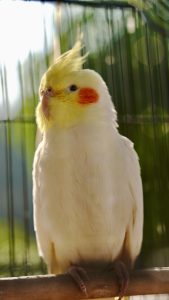
How to Feed Mango to Your Cockatiel
To feed your cockatiel mango, simply follow these steps:
1. Remove the skin.
2. Slice it in half and remove the stone.
3. Cut it into small pieces then place one piece in a separate bowl for your bird to try.
4. Watch closely to see if they enjoy eating it and that there are no problems afterward.
- Quality material: made of quality plastic, these bird food holders are not easy to break, can be applied for a long time and many times
- Ample quantity: the package contains 6 pieces these white bird food clips, enough quantity to use, replace and share with families or friends just press them and clip them on the cage, simple and effortless to use
- Proper size: each bird cage feeder clip is approx. 5.3 x 2.9 x 1.3 cm/ 2.09 x 1.14 x 0.51 inch, big enough to meet most of your using needs while will not take much space
- Wide application: these parrot fruit vegetable clips are suitable for most vertical bird cages and other small animals cage, practical tools for feeding parakeets, canaries, cockatiels, finches and other similar sized birds
- Good protection for hands: just fix the bird cage food holder on the cage, and then press it to clasp food, simple and effortless to use, protect your hands from being pecked at the same time
Is It Safe to Give Fresh Mango Juice to Your Cockatiel?
While fresh mango juice is safe for human consumption, it is not recommended to give it directly to your cockatiel. Cockatiels have specific dietary needs, and their digestive systems are not designed to process certain foods, including fruit juices.
Fruit juices, including mango juice, can be high in sugar and lack the fiber found in whole fruits. Feeding your cockatiel excessive amounts of fruit juice can lead to digestive upset, weight gain, and potential health issues. Additionally, the acidic nature of fruit juices may irritate your bird’s crop and digestive system.
It’s best to offer fresh fruits like mango in their whole form. Cut the mango into small, bite-sized pieces and provide it as a treat or part of a varied diet. This allows your cockatiel to consume the fruit along with its natural fiber content, which is beneficial for their digestion.
Remember, fruits should only make up a small portion of a cockatiel’s diet. The majority of their diet should consist of a high-quality pelleted food, supplemented with fresh vegetables and occasional fruit treats. Always consult with an avian veterinarian for specific dietary recommendations for your cockatiel to ensure their optimal health and well-being.
Alternative Fruits and Veggies for Your Cockatiel
Cockatiels eat oranges, cockatiels eat bananas and usually adore mangoes, but there’s always a possibility that yours won’t be a fan. Even if they are fans of the fruit, they still need to eat various other kinds of fruits and vegetables as part of cockatiel’s balanced diet. To give you an idea of what else your bird can consume, here is a list:
- Cockatiels eat blueberries
- Cockatiels eat apples
- Cockatiels eat cherries
- Apricots
- Pears
- Kale
- Zucchini
- Peas
- Bell Peppers
- Carrots
Final Thoughts on Can Cockatiels Eat Mango
So, now you know everything there is to know about feeding mangoes to your cockatiel in a manner that is both safe and healthy. Fruits and vegetables, such as mangoes, should make up approximately 20-25% of your bird’s diet. Make sure to offer them a wide range of fresh fruits and vegetables so they get a variety of different vitamins and minerals.
Fruits and vegetables should not replace your cockatiel’s regular pellet diet – they should only be an addition. If you do give them fruit, make sure to remove the skin and stone first, and don’t overfeed them. Overall, mangoes are a wonderful fruit to add to your cockatiel’s diet, assuming you follow the guidance above. They’re safe and most cockatiels devour them with gusto. I strongly advise you to give it a try!
Ensure your pet’s environment is safe by checking out Are Paint Fumes Bad for Cockatiels?. For an interesting take on health, read about the effects of sweets in Chocolate and Dental Health. Finally, understand common cockatiel behaviors with Why Does a Cockatiel Stand on One Leg?. Each of these articles is packed with valuable information to help ensure your cockatiel’s health and happiness.
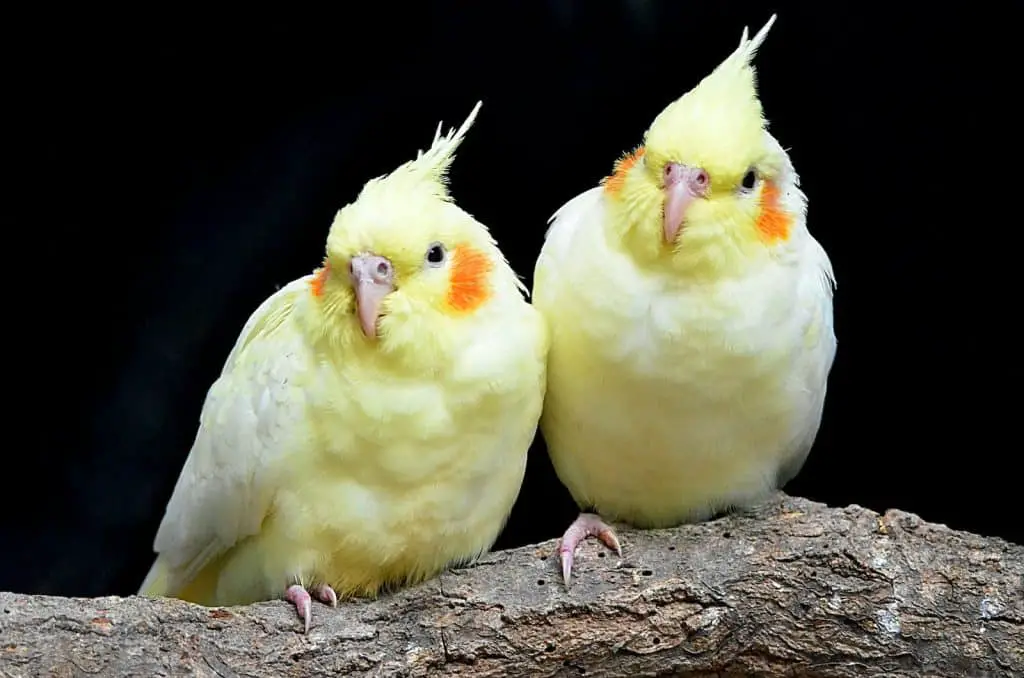

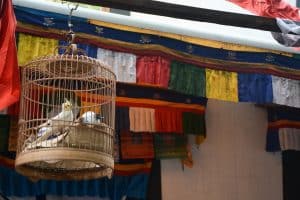
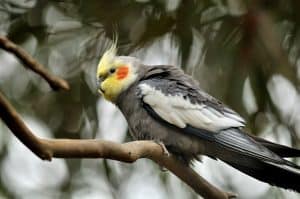
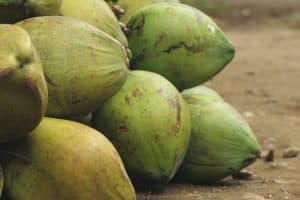
You have remarked very interesting points!
ps nice site.Blog range